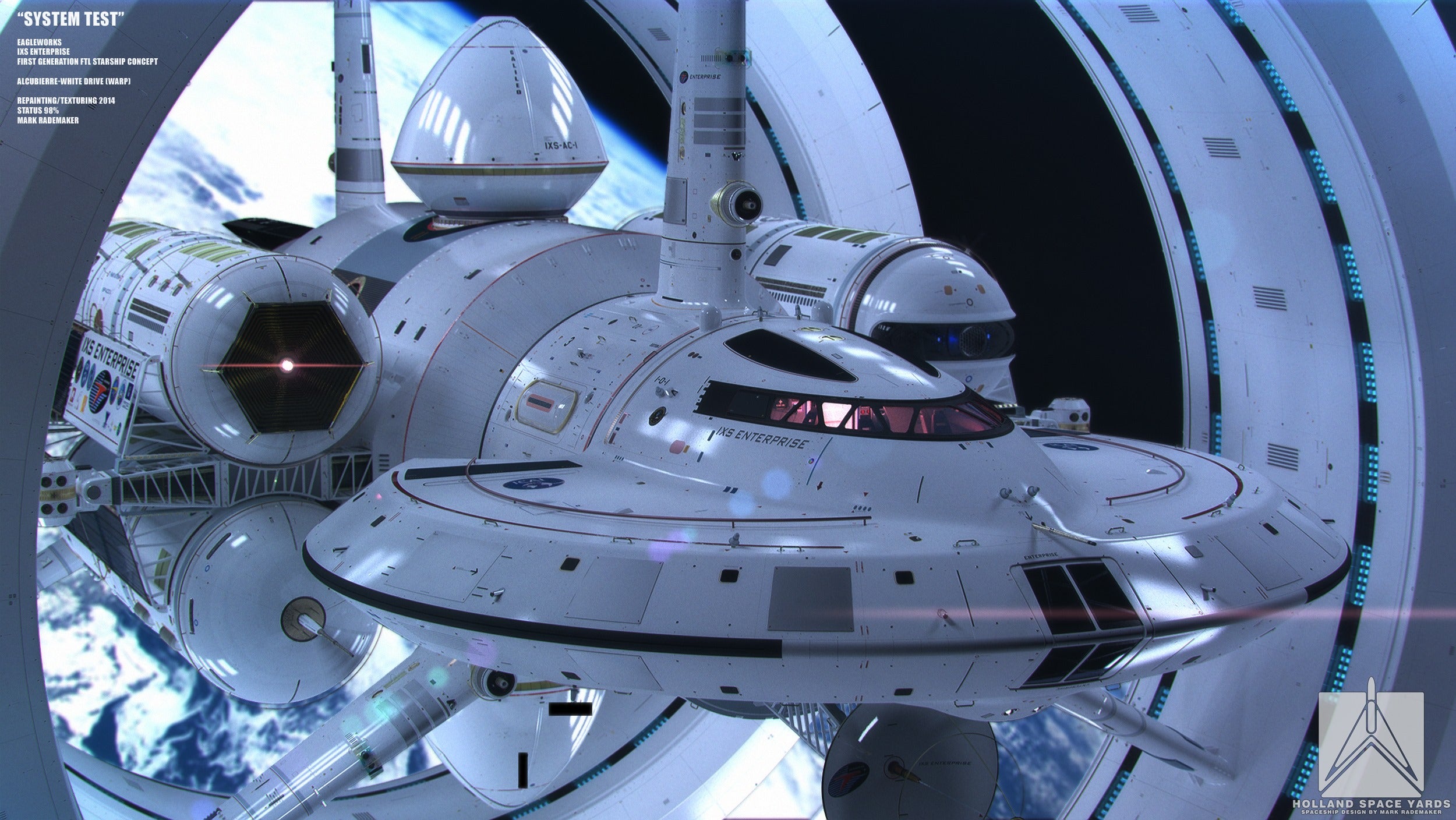According to NASA’s official website, faster than light travel is not yet possible. While they credit many theories in science fiction as credible, they cannot yet test their viability. As we discussed in class, even with infinite money, which NASA certainly does not have, and infinite resources, certain experiments are not possible. This holds true for interstellar travel because the advanced level of technology needed to achieve it- and that’s assuming it is possible- simply has not been developed yet. That being said, scientists do no the challenges we face currently, and why it is currently impossible, and why it eventually may become possible.

Concept Art for a potential Faster-Than-Light ship based on a prototype designed by a NASA scientist.
First, back in 1904, a man named Albert Einstein developed the theories of relativity. According to an article from the Guardian, Einstein’s special theory of relativity was based on two postulates. One, the speed of light is a constant variable. Two, the laws of physics apply everywhere and are not merely applicable to Earth. The first can be difficult to wrap your head around.
How can light be constant? What does that mean? In physics class in 10th Grade, my Prof. Mr. Cherry (the guy who read the book I talked about in my first post) explained this concept in a way I could understand, and in a way not dissimilar from that of the Guardian’s article. Imagine you are standing in a field watching a car go by on a dirt road. Relative to you the car is travelling 60 miles an hour, so the car speeds by you, appearing to travel quite quickly. Now imagine the same field, only you are on a train traveling 60 miles an hour, going the same direction as the car. Relative to you, the car is not moving because it is also going 60 mph. Now, some of that might be wrong I’m obviously not a science major. The point is, speed is relative. The Earth is rotating quickly to have 24 hour days, but we don’t notice it. Anyways, when you do the same concept, but replace the car with light. Whether you are travelling 60 miles an hour or standing still, light travels at the same speed.
The speed of light is measurable. A quick Google search tells us that the speed of light is 299,792,458 m/s. Because of Einstein’s special theory of relativity, we know that energy is mass times acceleration squared. In simple terms, this means that in the process of increasing the speed of an object, we also increase its mass. So, when we increase the speed of a spaceship, we also make it heavier. Objects that are heavier, in turn need more thrust to push them forward. This problem multiplies upon itself and is why lightspeed is so difficult, and currently impossible to reach. All credit for this explanation is again thanks to the same Guardian article.
In conclusion, the main issue is the obscenely large amount of energy needed to achieve lightspeed. Warp Drive, the reason ships in Star Trek can travel faster than light, is in theory a possible means of achieving lightspeed in real life. Several articles, including this one from Tech Times, discuss NASA’s mock-up of a spaceship that can bend space time around it, by using a loophole in the Theory of Relativity, and is thus capable of traveling faster than light. No tests or experiments of any kind have confirmed this theory and so the concept is just that- a concept. NASA is encouraging people with bright minds and bright ideas to pursue their dreams and attempt to answer this question once and for all. So, while we may not know now if faster than light travel is possible, we will know eventually. The true question is, when will we find out?


If there’s one thing we know for sure, its how little we actually know about the real mysteries of the universe. Why is its rate of expansion speeding up? How did it begin? How does life begin? Where are all the aliens? Maybe one day we’ll find the answers to all these questions. Or maybe, we’ll accidentally trigger something awful, and create a black hole in the proccess. Both of those eventualities are possible, I think.
Interesting! Honestly I new nothing about the stuff you wrote, but the way you wrote in this blog and eloquently described the facts, all is explained!! great work